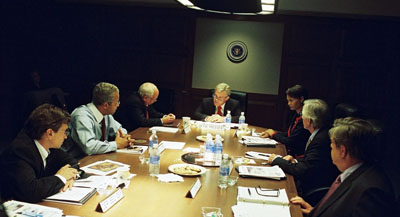|
|
Not Really An A-List:
|

|
With the recent release of Oliver Stone's celluloid summation of the second Bush administration – not to mention this election thing we're gonna do pretty soon, here – I would like, if I may, to take a brief departure from the A-List format. New at BOP: Share & Save
![]() Tweet
Tweet
![]() Print this column
Print this column
More than most White House tenures, the past eight years have had a great effect on the multiplex. It's easy to write this off as a result of the man in charge. Bush the latter is certainly the most divisive and controversial president since Nixon, and that's saying something when the last guy was taking blowjob breaks. However, there's more to the cinematic spillover than that. Hollywood has always been political, but the sheer number of films taking a stance is, I think, unprecedented.
Perhaps this is a result of 24-hour news, and the attempts of CNN and Fox to meld our politics with our entertainment in a permanent way. Perhaps it has something to do with the Internet – political movies are hard sells, but if you can rally your base online, as Fireproof recently demonstrated, you can still make some money. Most likely, however, it's a combination of factors, and I wouldn't be surprised to see many of these symptoms abate once someone new moves into 1600. (Notice how I pretended like we don't know who's going to win in that last sentence? Wasn't that nice and faux-partisan of me?)
The great splitting point, here – whether or not all this crossover is a good thing. Relevance and timeliness in the theater is certainly a positive, and the changing, healing power of art will never be questioned by me, in any form. However, I can't help but wonder if the response of contemporary filmmakers is act of obligation or of passion. It seems now that some directors and screenwriters are going political not because they necessarily want to, but because they feel it's the thing to do. One wonders how Clint Eastwood would've followed up the phenomenal one-two punch of Mystic River and Million Dollar Baby if he hadn't felt compelled to go to the war genre (and then how would Spike Lee have followed up The Inside Man if he hadn't felt the need to respond to Clint?)
|
Advertisement |
One field to separate, however – I'll bypass 9/11 and its effects for another time. These, too, are wide-ranging; the rebirth (or at least revitalization) of the disaster film, as seen most notably in Cloverfield, is one result, and realistically, the superhero genre owes something to the post-9/11 climate. However, politics aside, the attacks are a somewhat separate issue. Furthermore, a reminder that many of the films discussed herein would in no way make it to a normal A-List; I'll throw in a few picks here and there just in case you need to replenish that Netflix queue.
Without further pontificating or qualifying, The A-List presents The Bush Administration and Cinema.
War Movies Are Very Forcefully Back
The obvious entry is perhaps the most indicative of that "compulsion" I mentioned earlier. Artists, for better or worse, feel a need to respond and comment to their circumstances; for the past seven years or so, we've been living with war, as Neil Young would put it. Just as it did when Vietnam unwound – and lingered, and lingered – the cinema can't help but move to the battlefield. The curious thing this time around is that the audiences are simply not turning up. Some of the most direct comments on Iraq – The Kingdom, In the Valley of Elah, Stop-Loss, The Lucky Ones – have found meager to non-existent crowds. It's a sensitive topic – should these movies be made now? Probably, yes. Is there any call for them? No. Balancing that is up to the filmmaker.

|
|
|

|
Friday, November 1, 2024
© 2024 Box Office Prophets, a division of One Of Us, Inc.

